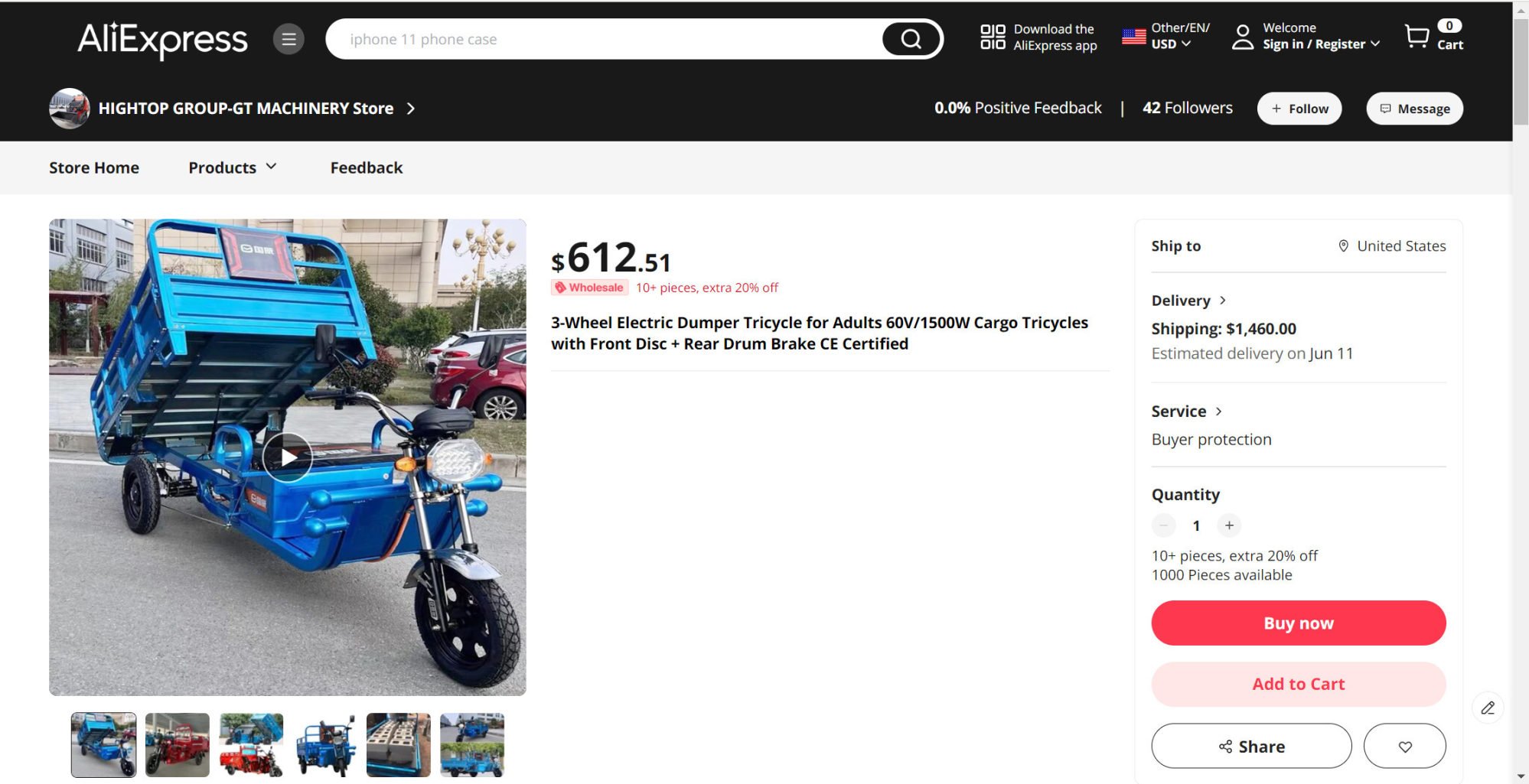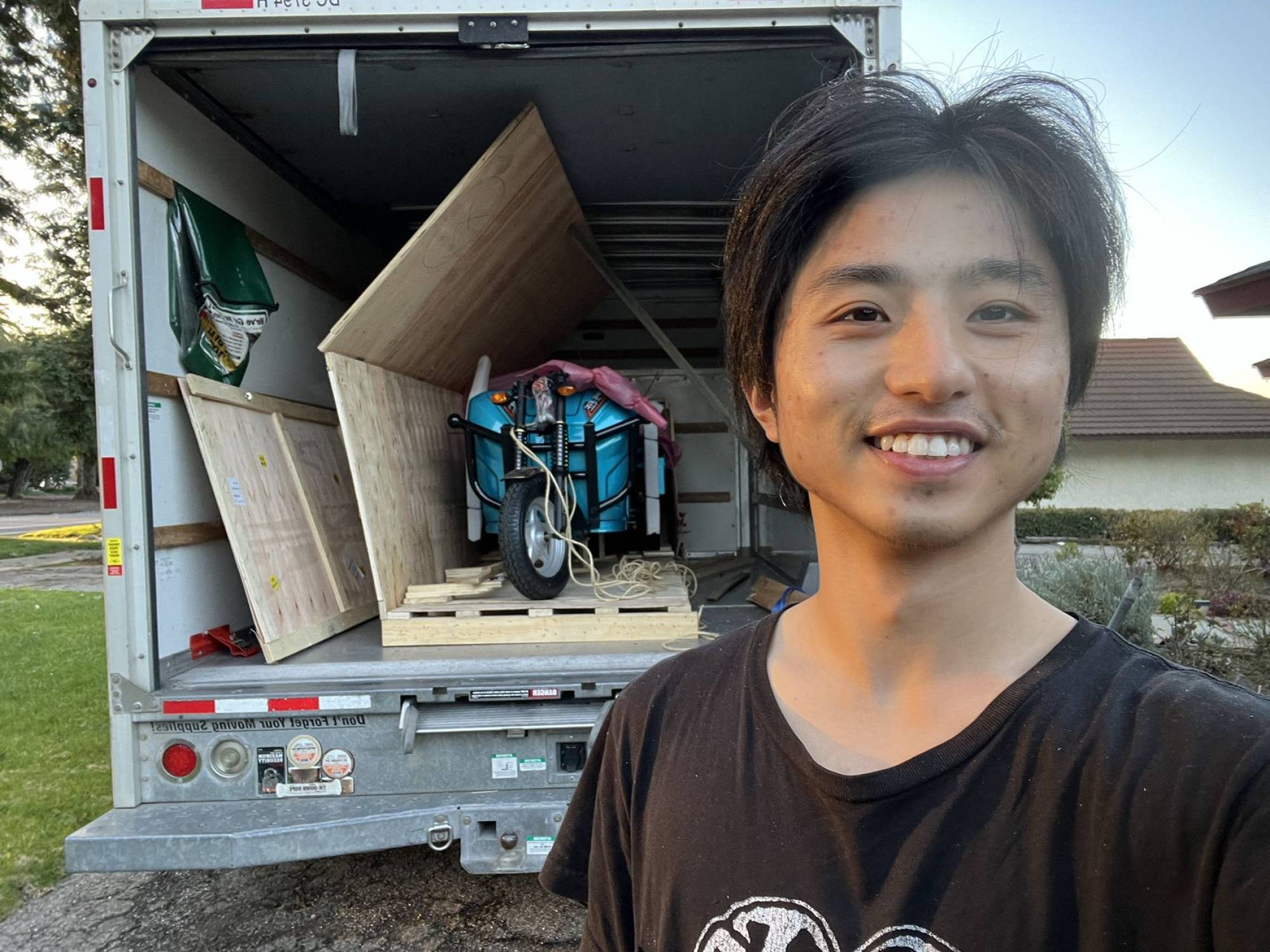The newer, all-electric versions share the same moniker, but offer a smoother and quieter ride, ideal for flexible freight transport over short distances.
Most importantly, they can now be purchased in the US for just $600 – excluding shipping costs. Later more.
These vehicles, unseen in the U.S. before this year, suddenly became a novel business opportunity for Chinese entrepreneurs and logistics companies in recent months, as small quantities arrived one after another in large wooden crates at American container ports.
It all started with videos from a vlogger named Bobo from the US, who is originally from Beijing and now lives with her family in Dearborn, Michigan – coincidentally, Henry Ford’s hometown.
For Christmas she gave her American father-in-law a tricycle, which quickly became a local sensation. The Beng Beng can carry a load of up to 700 kg (1,543 pounds) and can be charged simply by plugging it into a standard 110-volt outlet. Once fully charged, it can travel up to 60 km (37 miles). When reversing, a high-pitched female voice warns in Chinese: “Qing zhuyi, daoche” (“Be careful, drive backwards”).
When the family officially registered the bike as a motorcycle and started riding it on local roads, many neighbors took photos and asked where they could buy one.
When Bobo’s videos went viral on Chinese social media platforms in mid-January, Luo Hao, 25, who is from Guizhou province and now lives in New York City, called a friend. Within an hour, they decided to start a business: buying electric tricycles from China and selling them in the United States.
After placing their order with a Chinese manufacturer in January, the first batch of two dozen electric Bengs traveled across the Pacific and arrived at the port of Los Angeles on March 1. On that day, Luo’s sales revenue reached US$10,000; he sold out of his stock within three weeks.
However, for every vehicle Luo sells in the United States, freight costs can easily be double or triple the original price. On the e-commerce platform AliExpress, a three-wheeled electric tricycle shipped from Shandong, China costs $612.51, but shipping costs to the United States are $1,460.

“Everything is very cheap before it arrives in the US. Once the tricycle arrives, we may also have to rent a truck to deliver it to the buyer in another state, and that adds a few hundred dollars to the total cost,” Luo said.
Because of the high costs, Luo said his first entrepreneurial attempt didn’t make a profit – but he didn’t lose any money either. And his venture has inspired many others to follow his example after he posted about it on social media.
Shenzhen Topda Logistics is one of the first freight forwarding companies to enter the business, mainly accepting individual orders directly from overseas customers.
Usually they place the order on an e-commerce platform like Taobao; The vehicle will be sent to a specific warehouse in China. Topda is then responsible for shipping the vehicle to the customer’s final destination. Taobao and AliExpress are operated by Alibaba Group, which also owns the South China Morning Post.
However, shipping volumes have so far been minimal compared to Topda’s other divisions, according to a company manager who gave only his last name as Zou.
“It seems that the idea only became popular on Chinese social media as all the buyers were Chinese living abroad,” Zou said, questioning the sustainability of such a trade.
Zou said he has received more than 1,000 inquiries so far from Chinese expatriates in the US, Canada and Europe, but most have not followed up after learning the price. In total, the company has only delivered around 20 vehicles in the past three months.
And most customers are concerned about whether they can legally register such a vehicle in their countries or states, which he cannot guarantee, Zou said.
“Even in the US, the rules for registering vehicles are different in every state. “If you can get a license plate in Los Angeles, you may not be able to get one in New York,” he said.
In addition, the cost of shipping assembled individual vehicles in wooden crates is still too high, prohibiting export in large quantities, Zou added.
What is needed, he said, is “an influx of capital” to enable the delivery of parts to the USA and their assembly there. This, he noted, would help “make sales in the U.S.…more cost-effective.”
Nevertheless, Luo’s second shipment of imported tricycles is already on its way to the United States. He is also considering bringing in American shareholders and shifting his main customers from overseas Chinese to American farmers – by striking deals with local farm equipment shops.

Despite the high shipping costs, he still believes the vehicles are attractive to Americans because the prices, even after factoring in freight costs, are still at least ten times cheaper than pickup trucks.
“The price was so low that many thought it was unreasonable,” Luo said, referring to the American buyers he met.
“Then the Chinese-made three-wheelers will be the first to enter the US electric vehicle market,” he joked.
